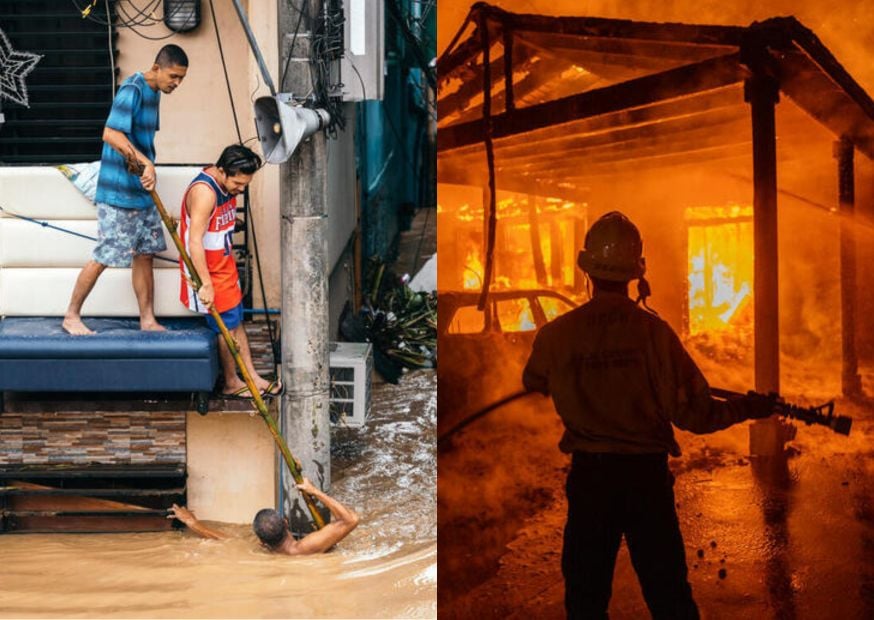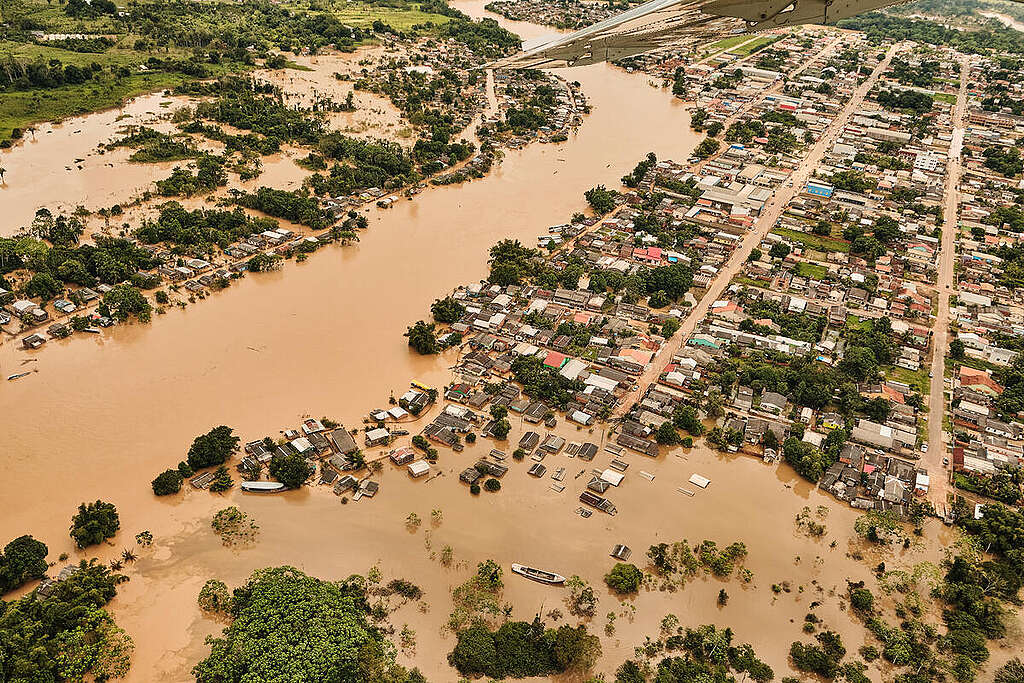
Whether you live in Manila or in Los Angeles, you're already feeling the impacts of the climate crisis. Last year's series of six typhoons hitting the Philippines within just 30 days was unprecedented. The flames that ravaged through LA's metropolitan area were equally historic. Scientific studies confirm Big Oil's greenhouse gas emissions made both catastrophes significantly more likely to occur.
Making dirty energy companies pay for climate disasters they have caused is not only fair – it's also practical. Consider their massive profits. In 2024, five oil and gas corporations alone reported over US$100 billion in total profit.
That is why making climate polluters pay is the most popular policy option in eight countries, according to a study commissioned last year by Greenpeace International.
On both sides of the Pacific Ocean, Greenpeace organisations are rallying governments to tax oil and gas corporations so communities may rebuild from climate disasters and invest in solutions.
Philippines: The CLIMA Bill for climate justice
Greenpeace Philippines is at the forefront of campaigning for the Climate Accountability (CLIMA) Bill to hold polluters accountable for climate damages.
The bill, which Greenpeace Philippines helped draft, mandates climate-related financial disclosures and emissions reduction roadmaps from companies. In addition to a domestic legal framework for loss and damage, mandating due diligence and prevention of human rights harms, particularly in the context of climate change.
Under the bill, extreme weather survivors may seek redress for harms caused by climate impacts, and a reparations fund shall be used to respond to these claims. The reparations fund will come from penalties slapped on oil and gas corporations and other carbon-intensive industries which breach acceptable emissions thresholds set by the CLIMA Bill. Claims can help marginalized fishers, for instance, replace boats destroyed by extreme weather or smallholder farmers to improve irrigation systems.
The bill is the first of its kind in the Global South, where the impacts of climate change are felt most acutely - despite these countries contributing the least to global emissions.
USA: The Polluters Pay Climate Superfund Act
California is the largest economy in the United States. If it were a nation, it would be the world's fifth largest economy. Yet, it is also on the frontlines of the climate crisis. Over the past few years alone, California has experienced massive wildfires, deadly heat waves, record floods and more.
Greenpeace USA is campaigning for the Climate Superfund Act in California to hold oil companies accountable for their role in fueling the disasters that devastate the state.
Similar to policies already adopted in Vermont and in New York, [1] the Climate Superfund Act would create a dedicated fund to aid the recovery and rebuilding efforts through fees imposed on large oil and gas corporations relative to their historic emissions and role in driving the climate crisis, effectively making them pay for their fair share of damage they've caused.
Greenpeace USA staff and volunteers are conducting research, advocacy and public communications, while also organizing on the grassroots level. That includes efforts alongside workers and labour unions, like the California Federation of Teachers. These union members will greatly benefit from the creation of the Climate Superfund, which will help ensure those climate costs aren't forced onto taxpayers or state and local budgets that Californians depend on for schools and other crucial social programs.
Though California is known for its progressive politics and "green" image, its politicians don't always live up to those expectations. Recent lobbying included in financial disclosures showed oil and gas companies spent a record US$ 38 million during 2024 to fight climate and environmental justice policies in California. Their efforts concentrated heavily on blocking the Make Polluters Pay Climate Fund.
That's why Greenpeace USA launched the Dirty Dems campaign, spotlighting Democratic lawmakers who have taken the most money from the oil and gas industry and voted against critical climate and other progressive priority legislation.
Greenpeace USA is demanding more from state politicians and Governor Gavin Newsom - it's time they side with people over corporate donors, and make polluters stop drilling and start paying.
A global movement takes shape
Around the world pressure is growing to introduce new taxes and fines on oil and gas corporations, to help communities nationally, regionally and globally rebuild from climate disasters and invest in climate solutions. From France to India, from South Africa to the UK, the Polluters Pay Pact is an international initiative, to hold accountable international corporations for an international problem. Our strength is in numbers: add your voice now to the Polluters Pay Pact.
It's time to make the polluters pay. Sign now to hold the oil and gas corporations accountable, and support a safe and fair future for all.
Jefferson Chua is a Climate Emergency Preparedness and Response Campaigner at Greenpeace Philippines. Amy Moas (Ph.D.) is a Senior Climate Campaigner at Greenpeace USA.

 (@greenpeace)
(@greenpeace)





